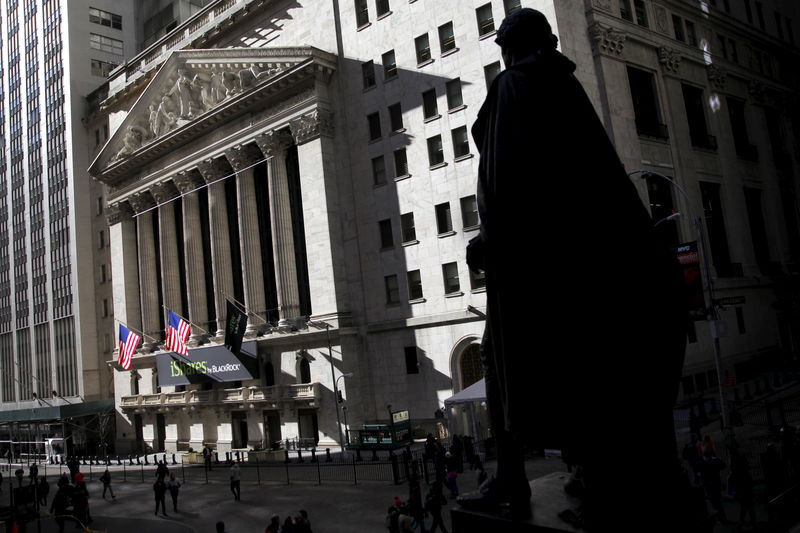Investing.com -- U.S. stock futures mostly hover above the flatline heading into the final trading day of the week, as investors digested fresh inflation data and eyed the path ahead for Federal Reserve interest rates. OpenAI is reportedly planning to name new board members, as the artificial intelligence group behind ChatGPT faces increased regulatory scrutiny. Elsewhere, China's manufacturing activity slows for the fifth straight month in February.
1. Futures broadly higher
U.S. stock futures rose on Friday, pointing to an extension in gains notched in the prior session that were fueled by inflation data this week that bolstered hopes for a mid-year interest rate cut from the Federal Reserve.
By 03:20 ET (08:20 GMT), the S&P 500 futures contract had climbed by 9 points or 0.2%, Nasdaq 100 futures had inched up by 65 points or 0.4%, and Dow futures were mostly unchanged.
The main indices on Wall Street all finished in the green on Thursday, with the benchmark S&P 500 and tech-heavy Nasdaq Composite closing at fresh record highs. The blue-chip Dow Jones Industrial Average, meanwhile, edged up by 0.1%.
The personal consumption expenditures (PCE) price index -- an inflation gauge closely-monitored by the Fed -- eased as expected in January. The reading spurred hopes that inflationary pressures will abate in the coming months, giving the Fed enough impetus to reduce rates in June.
2. OpenAI to name new board members - WaPo
OpenAI is planning to name several new board members in March, The Washington Post (NYSE:POST) reported on Thursday, as regulatory scrutiny on the artificial intelligence darling intensifies.
The Washington Post report comes after other media reports suggested that the U.S. Securities and Exchange Commission was investigating whether the firm misled investors during a major upheaval in its top leadership in November, which included the abrupt firing and reinstatement of CEO Sam Altman.
OpenAI completely revamped its board at the time, removing the group of directors that had attempted to oust Altman. A new board consisting of ex-Twitter Chair Bret Taylor, former Treasury Secretary Larry Summers and Quora CEO Adam D’Angelo was also unveiled.
Microsoft (NASDAQ:MSFT), which is OpenAI’s biggest backer, will also take a non-voting, observing seat on the board, Altman has said.
3. JAB to sell $3 billion in Keurig Dr Pepper shares
Keurig Dr Pepper (NASDAQ:KDP) (KDP) has announced that European investment conglomerate JAB Holdings will sell up to 100 million in shares in the U.S. beverage maker, according to a statement on Thursday.
In a move worth roughly $3 billion at KDP's most recent closing price, a JAB subsidiary is looking to offload just under 87 million shares through a secondary offering. JAB has also given an option to Morgan Stanley (NYSE:MS), the follow-up share sale's underwriter, to buy up to just over 13 million shares. It would be the biggest secondary share sale of a U.S.-listed group since 2022, the Financial Times reported.
JAB Chief Executive Joachim Creus said the proceeds of the sale will allow the firm, which is backed by the billionaire Reimann family, to maintain its "leverage target in line with our financial policies."
"KDP will continue to be one of our most important investments and we expect to continue to be a long-term anchor shareholder in KDP, at or above the 20% ownership level," Creus added.
4. Chinese factory activity slows in February
Chinese factory activity shrank as expected in February, taking little support from stronger demand during the Lunar New Year holiday as broader weakness in the world's second-biggest economy persisted.
The official manufacturing purchasing managers' index read 49.1 in February, data from the National Bureau of Statistics showed on Friday. The mark was in line with expectations and lower than the 49.2 registered in January.
The reading now been in the sub-50 territory that indicates contraction for five consecutive months.
China's manufacturing sector is among the biggest drivers of the country's economy, and is at the heart of a sluggish post-COVID rebound over the past year. Beijing has rolled out a slew of monetary stimulus measures in recent months in an effort to shore up growth. But they have so far provided limited support, with investors now clamoring for more targeted fiscal measures.
5. Oil prices subdued
Oil prices were subdued in European trade on Friday, as broader market optimism that easing inflation could persuade the Fed to begin slashing interest rates by mid-2024 was offset by signs of higher supplies.
Prices were largely rangebound after data showed record-high U.S. production and elevated output from the Organization of the Petroleum Exporting Countries (OPEC), which both signaled that global oil markets may not be as tight as initially expected.
Brent oil futures expiring in May were mostly unchanged at $81.94 a barrel, while West Texas Intermediate crude futures had dipped 0.2% to $78.14 per barrel by 03:34 ET.
Both contracts were on pace to clock weekly gains following a sharp fall in the previous week. While oil prices did notch some gains in February, they have largely remained between $75 to $85 a barrel so far in 2024.
